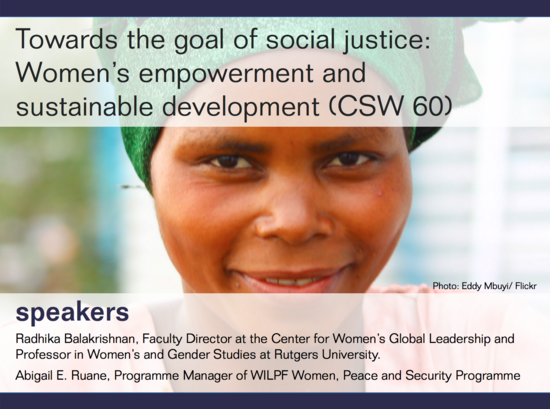WILPF Academic Network Webinar: Women's Empowerment and Sustainable Development:
By: Marina Kumskova

Photo Credit: Eddy Mbuyi/Flickr
As part of our preparations for the 60th Commission on the Status of Women and as part of our ongoing webinar series by the WILPF Academic Network, WILPF hosted a webinar on March 2, 2016, on the topic, “Towards the Goal of Social Justice: Women’s Empowerment and Sustainable Development (CSW 60).” The discussion of this webinar focused on shifting the current economic and security paradigm to promote people over profit for human rights, human security, and sustainable peace.
WILPF PeaceWomen Programme Director, Abigail Ruane, introduced the webinar, highlighting how investing in gender equitable sustainable development is a key element of conflict prevention and sustainable peace. She highlighted how the 1987 Brundtland Report and subsequent Rio conferences on sustainable development supported a holistic understanding of development based on the intersection of environmental protection, social development (including women’s human rights), and economic development. Peace activists and women human rights defenders from Syria to the Democratic Republic of the Congo and beyond have brought attention to the incompatibility of human security with prevailing military arrangements. Strengthening women’s substantive participation and rights and moving from an economy of violence and war to an economy of gender justice is critical for sustainable and democratic peace.
The Center for Women’s Global Leadership (CWGL) Faculty Director Radhika Balakrishnan then provided a gender analysis of current macroeconomic policies and explored how to promote human rights through macroeconomic policy. She spoke on the importance of addressing women’s limited access to education, budgetary cuts to healthcare, and unpaid work, which is provided disproportionately by women on a daily basis. Balakrishnan analysed the way countries respond to global economic instabilities often disproportionately impacts women and girls. She reminded participants that the international community has made strong and comprehensive commitments to gender equality and women’s rights. Human rights treaties, mechanisms and instruments have addressed the issues of women’s participation and leadership and women’s access to and control over resources, and we need to strengthen accountability on these commitments including through macroeconomic policy.
In closing, the panelists of the webinar reiterated the need for the full and meaningful implementation of the international framework regarding gender equality and women’s human rights. As the 2015 Sustainable Development Goals (SDGs) are taken forward, it is critical to ensure implementation is conducted through a human rights lens with women’s human rights at the core.
For the full recording of the webinar, please check WILPF’s YouTube Channel.
